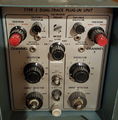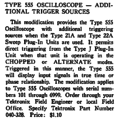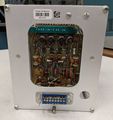J: Difference between revisions
No edit summary |
mNo edit summary |
||
| (14 intermediate revisions by 3 users not shown) | |||
| Line 1: | Line 1: | ||
{{Plugin Sidebar | |||
|manufacturer=Tektronix | |||
|series=500-series scopes | |||
|type=Type J | |||
|summary=35 MHz dual-trace amplifier | |||
|image=Tek type j 1.jpg | |||
|caption=Tektronix Type J | |||
|introduced=(not released) | |||
|discontinued= | |||
|designers=Ron Olson;Phil Crosby; | |||
|manuals= | |||
* [[Media:type_j_tentative.pdf|Tektronix Type J Tentative Specs]] (OCR) | |||
''(not released as a product)'' | |||
}} | |||
The '''Tektronix Type J''' is a 35 MHz dual-trace plug-in for [[500-series scopes]] which never went into production. | The '''Tektronix Type J''' is a 35 MHz dual-trace plug-in for [[500-series scopes]] which never went into production. | ||
It was designed by [[Ron Olson]] with help from [[Phil Crosby]]. | |||
Regarding Type J development with Ron Olson, Phil Crosby recalls: | |||
<blockquote> | |||
I was helping him to pursue parasitic oscillations (we used to call it "bird hunting"). | |||
It was common to say when an amplifier had a parasitic oscillation to say that it "sung". | |||
At one point I was peering closely at a J unit prototype while Ron was probing it and a finger on his left hand touched the +225. | |||
The reflex caused the back of his hand to strike my nose pretty hard. | |||
Damn near bloodied it. | |||
Vacuum-tube voltages and solid-state devices had an uneasy relationship. | |||
In those days, a common probing tool was the point of a #2 pencil. | |||
</blockquote> | |||
The Type J's tentative announcement was in 1963. | |||
It appears to be similar to the [[1A1]], which was [[introduced in 1964]]. | |||
The [[547]] training guide, dated December 30th, 1963 mentions "a new dual trace plug-in, the 1A1 (also known as the J)." | |||
Note: The Type J does not have a [[547#Spoiler_Switch|spoiler switch]] hole in the rear panel, while the 1A1 does have such a hole. | |||
<gallery> | <gallery> | ||
Tek type j 1.jpg | |||
Tek type j 2.jpg | |||
Tek type j 3.jpg | |||
Tek type j 4.jpg | |||
Tek type j 5.jpg | |||
Tek type j 6.jpg | |||
Tek type j 7.jpg | |||
Tek type j 8.jpg | |||
Tek type j in case.jpg | Tek type j in case.jpg | ||
Tek type j.jpg | Tek type j.jpg | ||
Dec 1963 service scope type j.png|Reference to Type J in December 1963 Service Scope | |||
Late tek type j front.jpg|Late Type J with spoiler switch hole | |||
Late tek type j left.jpg|Late Type J with spoiler switch hole | |||
Late tek type j right.jpg|Late Type J with spoiler switch hole | |||
Late tek type j rear.jpg|Late Type J with spoiler switch hole | |||
</gallery> | </gallery> | ||
[[Category:500 series plugins]] | [[Category:500 series plugins]] | ||
[[Category:Prototypes]] | |||
Latest revision as of 23:57, 9 March 2023
The Tektronix Type J is a 35 MHz dual-trace plug-in for 500-series scopes which never went into production. It was designed by Ron Olson with help from Phil Crosby.
Regarding Type J development with Ron Olson, Phil Crosby recalls:
I was helping him to pursue parasitic oscillations (we used to call it "bird hunting"). It was common to say when an amplifier had a parasitic oscillation to say that it "sung". At one point I was peering closely at a J unit prototype while Ron was probing it and a finger on his left hand touched the +225. The reflex caused the back of his hand to strike my nose pretty hard. Damn near bloodied it. Vacuum-tube voltages and solid-state devices had an uneasy relationship. In those days, a common probing tool was the point of a #2 pencil.
The Type J's tentative announcement was in 1963. It appears to be similar to the 1A1, which was introduced in 1964. The 547 training guide, dated December 30th, 1963 mentions "a new dual trace plug-in, the 1A1 (also known as the J)." Note: The Type J does not have a spoiler switch hole in the rear panel, while the 1A1 does have such a hole.
-
-
-
-
-
-
-
-
-
-
-
Reference to Type J in December 1963 Service Scope
-
Late Type J with spoiler switch hole
-
Late Type J with spoiler switch hole
-
Late Type J with spoiler switch hole
-
Late Type J with spoiler switch hole















